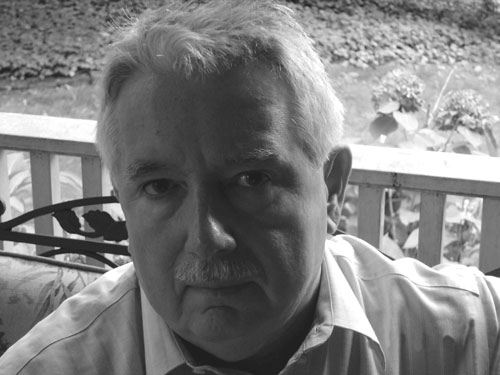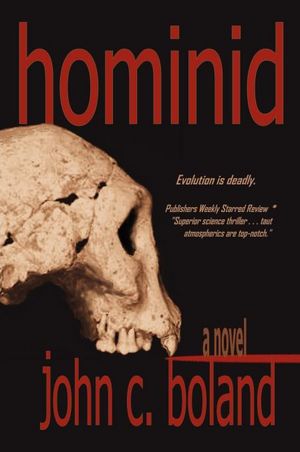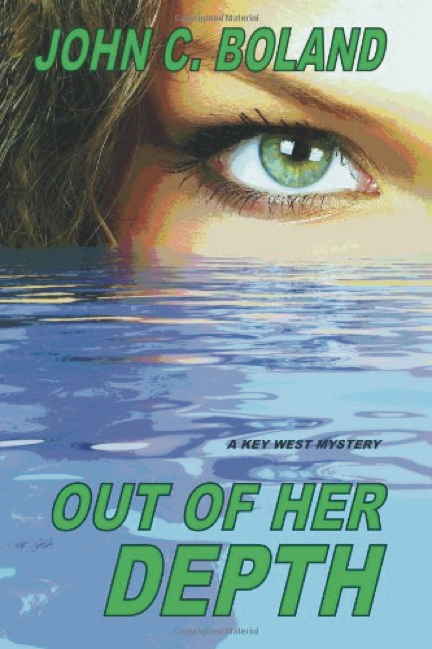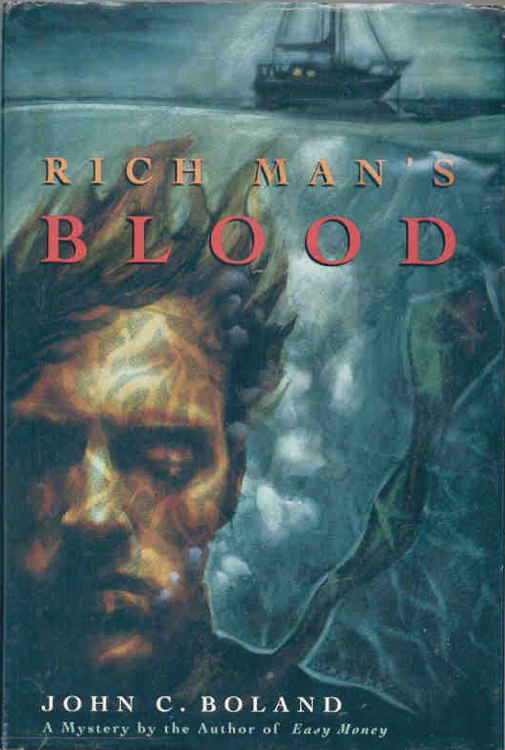 Boland considers the consequences of evolutionary rivalry in his new science thriller
Boland considers the consequences of evolutionary rivalry in his new science thriller
John C. Boland’s short fiction has been appearing in Alfred Hitchcock’s and other magazines for 35 years, and he is the author of almost a dozen mystery novels under his own name and pseudonyms. He has worked as a senior editor of Barron’s Financial Weekly, contributed often to The New York Times and The Wall Street Journal, and run a profitable hedge fund.
Boland’s eclectic interests have always informed his work, and his new novel, Hominid, is no exception. It explores evolution, genetics, archaeology, and a centuries-old mystery.
In Hominid, archaeologist David Isaac joins a team excavating a crypt on a remote island where a colonial-era family lies buried. By local lore, the family members were “devils.” The expedition’s leader hopes to revive his career by proving they were murdered by neighbors in a burst of religious hysteria. But these cadavers harbor an older and deadlier secret–evidence that a new humanoid species has emerged.
ETHAN CROSS FOR MYSTERY SCENE: Many of your past books have been mysteries. How would you classify Hominid? Mystery, thriller?
JOHN C. BOLAND: Hominid is a science thriller that develops as a series of mysteries. What happened among early colonists on Ewell Island? Why were three of them buried in lead-shrouded coffins? Why were a four-year-old child and her father murdered? Why is the mother’s coffin empty? Who is sponsoring the island excavation and why? The big question comes a bit later, and it concerns deviations in the child’s DNA from the normal human genome.
 Is Hominid entirely fictional or is it based upon actual local lore and legend?
Is Hominid entirely fictional or is it based upon actual local lore and legend?
It’s fiction with many factual reference points—starting with the discovery in St. Mary’s City, Maryland, 20 years ago of three lead coffins buried in a church dating from the 1660s. The use of lead coffins wasn’t uncommon in England, but it taxed the resources of an early American colony. So the reality was fascinating. I shifted the location to a nearby island, where St. Mary’s dissidents in fact had settled, and created the local lore that the buried family were viewed in 1700 as devils.
Where does “science fact” end and “science fiction” begin within the novel?
Publishers Weekly called it science fiction, but I don’t regard it as such. The science is well-grounded. The key speculation is fictional, but it’s also consistent with everything we know about Darwinian evolution. The pressure on scientific research by government is also factual—as is the misuse of science by government and other institutions, witness the eugenics movement in the United States that led to forced sterilizations. So there’s a very dangerous mix of competing interests and beliefs.
Hominid deals with the discovery of a new humanoid species through the unearthing of some colonialera cadavers. Is the book focused on the mystery of what happened in the past or are there current dangers that arise because of the discovery?
The dangers appear in the first chapter, when a young archaeologist is killed in the deep excavation and the main character almost loses his life. It gets worse. The story occurs entirely in the present. The role of the past is to provide evidence of what has been happening for perhaps millennia, unseen and unsuspected: the development of a human variant that threatens to supplant us. This raises the philosophical and moral question: Threatened by extinction, would we stand aside and let evolution take its course? Or would Homo sapiens launch an extermination campaign against the newcomer?
What kind of research did you do for your new book?
The research was fun. I visited genetic testing labs. In New York, I toured Cold Spring Harbor Laboratory. I read dozens of books on evolution and speciation. The challenge was to keep the research out of the novel—the idea was to tell a good story that wasn’t inconsistent with what is known. There is a reading list at the back of the book in case anyone is interested in this fast-moving branch of science.
The key thing that intrigues me is how plausible the idea of a human mutation developing within an island population is, and secondly, how rapidly evolution occurs under strong selection. There’s a fellow at the University of Chicago whose work suggests that one very useful gene, the “lactase” gene that permits adults to metabolize milk, has penetrated most of the European population in about 7,000 years. I speeded things up for the novel, but I wonder by how much? We had a tiny hominid cousin, Homo floresiensis, living in Indonesia as recently as 13,000 years ago. I’d better add right now that Hominid isn’t a treatise on evolution: It’s a thriller full of immediate conflict, a love story, and a lot of mayhem. I really laid on the mayhem.
 What are you reading now? What are some of your favorite books and what authors have had the greatest influence on your own work?
What are you reading now? What are some of your favorite books and what authors have had the greatest influence on your own work?
Right now, in truth, for some reason I’m reading the old Perry Masons. They’re almost straightforward “story.” I can picture Della Street from the TV series, but Gardner sure doesn’t tell us what she looks like. I liked the early Dick Francis novels a great deal, probably for bad reasons: There was quite a dollop of sadism in them, but the hero always pushed ahead, and the romantic subplots appealed to me, especially in Nerve. I loved some of Geoffrey Household’s thrillers: The Courtesy of Death (which also has an archaeological aspect), and Dance of the Dwarfs. Intelligent, elegantly written thrillers. Among contemporary writers, I admire John Sandford and Lee Child, both of whom produce smooth, fast-moving prose. On the science front, I’m reading a superb book by Richard Dawkins, The Greatest Show on Earth, which should be part of every high school science curriculum.
What’s something that you’ve learned about the publishing business that you weren’t expecting?
That 60 or more literary agents can decline to represent a novel that gets a starred review in Publishers Weekly.
Do you have any advice for aspiring (or struggling) writers out there?
They should read the answer to the preceding question. It cuts two ways. And for heaven’s sake, develop a good income outside this field.
Are you currently working on a new book? Can we get a sneak peek?
I spend a fair amount of time writing short stories for Alfred Hitchcock’s Mystery Magazine. One novel I’m tinkering with is altogether different from Hominid. It’s called The Man Who Knew Brecht, has an artist heroine, and deals with murder growing out of old far-left political activity. (And apropos the previous question: If you want to self-sabotage a writing career, write novels that explore widely different themes and settings. I’ve found this technique works very well.)
In recent years you’ve become a publisher yourself. How did that come about?
Like most bad ideas, this one took time to develop. St. Martin’s and Pocket Books had published a half-dozen of my financial mysteries in the ’90s. Then they stopped buying them. Linda Landrigan at Alfred Hitchcock’s Mystery Magazine was taking my short stories, and one—which was in Ellery Queen’s—got nominated for a couple of awards. So it looked as though I was still writing things people would read. I got into publishing to ensure that a few novels I was picking away at would see print.
 Tell us a little bit about Perfect Crime Books.
Tell us a little bit about Perfect Crime Books.
Perfect Crime developed because I found there were quite a few other writers who had been at it for years, knew how to tell a good story, but had been dropped by their publishers. Plus there were writers who still had good publishing deals for their new books but whose old work was out of print. So our list includes Terence Faherty, Francis M. Nevins, Robert J. Randisi, Ed Gorman, Edward Cline, Stephen Mertz, Max Allan Collins. Some titles are new, some reprints. Plus we’ve published a handful of relative newcomers. We pay small advances, lay no claim to sub rights, and pay at least 50 percent of gross profits to the authors. We’ve done more than 30 books in the last two years and have 13 lined up for the first quarter of 2012. The new list includes six of Max Allan Collins’ crime novels about a gunman named Nolan, and Mike Nevins’ two novels about scam artist Milo Turner. We’re also bringing out a scholarly work: Joe Goodrich’s edition of letters by Frederic Dannay and Manfred B. Lee, who wrote as Ellery Queen. Any writer who ever dreamed of having a collaborator to lean on should read the letters of that partnership.
Has being a publisher and working with writers and bookstores changed your view of the business?
Writers tend to be pretty nice people, so that part of the business has been a pleasure. They work under sweatshop rules. The ones who are any good give away a lot of themselves. And they do this mostly for money you wouldn’t cross the street for if it were a purely commercial decision. As for bookstores, I love them. But the business model that lets a store return unsold copies puts a small publisher at considerable risk. I’ve tried to accommodate stores by offering larger-than-normal discounts, so if they can’t move a book at list they can mark it way down. Most of our sales, though, come on Amazon. If a title gets good trade reviews, then we get some library business. I’ve just started to publish Kindle editions, which in principle I detest. But that’s the market today: Newspapers and magazines are mere electronic “content,” and it seems that to many readers so are books, electronic consumables. It feels weird to me. I still have 35-cent paperbacks I bought 50 years ago, when every small-town drugstore had a book rack. But my house may collapse someday. A Kindle owner doesn’t have to worry about that.
A John C. Boland Reading List
Science Thriller
Hominid (2011)
Crime Novels
Long Pig (as James L. Ross, 2011)
The Margin (1995)
Death in Jerusalem (1994)
Rich Man’s Blood (1993)
The Seventh Bearer (1993)
Brokered Death (1992)
Easy Money (1991)
Key West Crime Novels
Out of Her Depth (2009)
Last Island South (2009)
Short Story Collection
30 Years in the Pulps (2009)
Nonfiction
Wall Street’s Insiders (1985)
Ethan Cross is the internationally bestselling author of The Cage and The Shepherd—and the pen name of a thriller author living and writing in Illinois with his wife, two daughters, and two Shih Tzus.
This article first appeared in Mystery Scene Holiday Issue #122.

